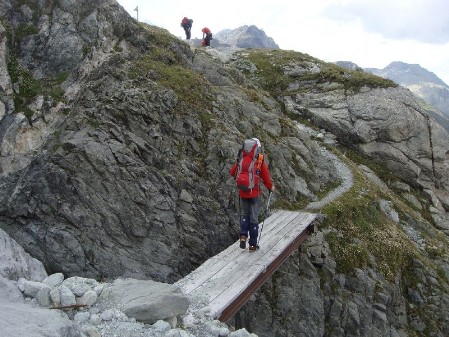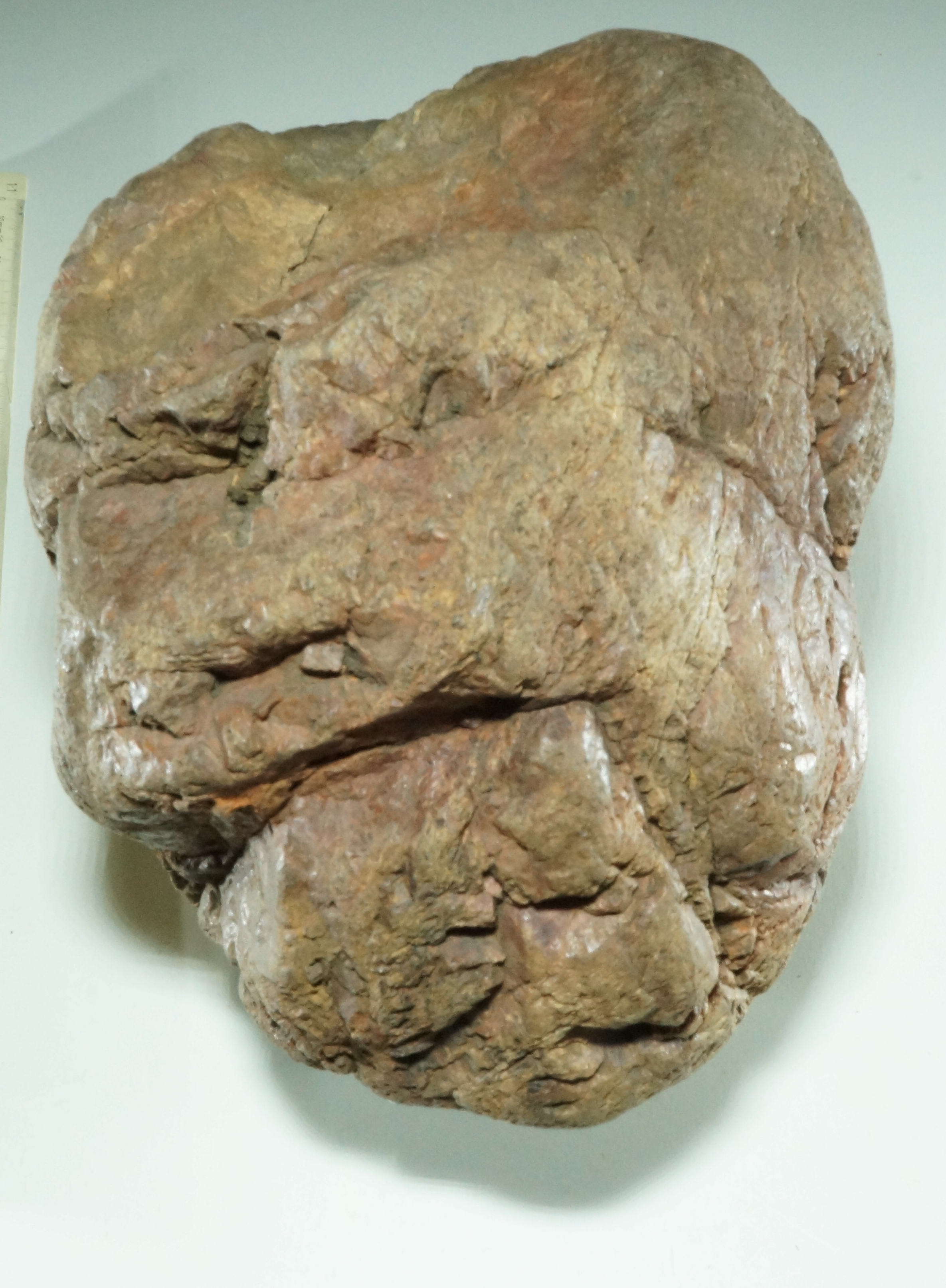.

This short piece of prose probably marks the beginning of one of Kafka's most creative periods, after two unfinished novels and almost two years of unsuccessful literary endeavour. It is probably the first work he wrote, in the winter of 1916/7, in the tiny house on Alchemists' Lane in Prague Castle, where he could spend his evenings and nights completely undisturbed and away from his family. The idea of the lonely bridge far away in the mountains could have come from this situation, although one should always be very careful with biographical references when dealing with Kafka.
The title of the play is not Kafka's, but the word bridge appears in the very first sentence and sets the theme.
Ich war steif und kalt, ich war eine Brücke, über einem Abgrund lag ich, diesseits waren die Fussspitzen, jenseits die Hände eingebohrt, in bröckelndem Lehm hatte ich mich festgebissen.
I was stiff and cold, I was a bridge, over an abyss I lay, on this side the tips of my feet were drilled, on the other side my hands, in crumbling clay I had clung.
[The first sentence describes the initial situation, where the idendification of a person with a bridge makes one think of something only imagined or dream-like, which is also underlined by the mention of the dream towards the end of the piece. The description begins at first like the objective description in an authorial narrative. With "stiff and cold", the influence of being a bridge on the emotional life of the I, or more precisely, the practical elimination of this emotional life, is indicated. The tips of the feet and the hands "were drilled in". It does not say: had I drilled in, analogous to the following "I had clung". This suggests that the I has allowed itself to be anchored like a bridge through drilled holes. But then some human feeling comes into play in the addition at the end. The ground consists only of "crumbling clay", which apparently makes the I, especially with regard to the "abyss", feel so insecure that it clings all the more tenaciously. At any rate, that is how I would understand "festgebissen" ("bitten down"), since biting down in crumbling clay is difficult to imagine even in a dream.
The fact that Kafka speaks of "this side" and "beyond" instead of simply of this side and the other should not tempt us to assume that this is a bridge between this world and the beyond, because there are not even allusions to "this world" and all we know about the "beyond" is that it consists of crumbling clay.
Here one can rather think of the well-known Nietzsche quotation:
Man is a rope, knotted between animal and superman - a rope over an abyss.
...
What is great about man is that he is a bridge and not an aim: what can be loved about man is that he is a transition and a downfall.
[Friedrich Nietzsche: Werke in drei Bänden, Munich 1954, Vol. 2, p. 281].
With man as a bridge over an abyss, there is a remarkable correspondence between the two texts. Kafka also speaks of downfall, though in a quite different sense from Nietzsche, as we shall see. He dealt with Nietzsche early on, but the I in this text can probably be understood more as an ironic contrast to Nietzsche's Übermensch and to his heroic and antiquated world. One could almost speak of a taunting of Kafka against Nietzsche's megalomania and his poor metaphors].
Die Schösse meines Rockes wehten zu meinen Seiten.
The tails of my coat waved at my sides.
[The latter is already evident here, where we get a little closer to the person of the I. Interestingly, Kafka avoids referring to the I as he or she. Thus, at first we can only say that it is someone dressed in a coat with tails, thus probably someone in a somewhat more elevated position. One could think of a company employee who has been assigned a task that is not easy, and who now devotes himself to this task with all his strength and a lot of patience, even if it attracts little attention in the lonely place. Nor can he become active himself. 'With waving coattails' is what one says when someone is particularly active and on the move. The fact that the I mentions the tails that are apparently only moved by the wind can also be seen as a sign of frustration at his own inactivity.
Even more interesting, however, is the separation of the two words coat and tails in Kafka's sentence, especially with regard to the question of whether the bridge is female or male. The word 'Rock' in the sense of 'coat' alone can refer to both women and men. The same applies to 'Schoß' in the sense of 'tail', although the special meaning for women (in German 'Schoß' also means 'womb') stands out. Of all things, it is the addition of this word that makes the coat in our text a male garment ('Rock' also could mean 'skirt') though clearly only through the mention of waving, because 'with waving coattail' was only said of men. It can be assumed that by separating the two words, Kafka wants to make us aware of these complex connections. At the same time, it can be understood as a warning, also for the following text, to prematurely classify persons in a female-male schema].
In der Tiefe lärmte der eisige Forellenbach.
The icy trout stream roared in the depths.
[With a few words, the threatening-rough and at the same time fascinating mountain landscape is hinted at here].
Kein Tourist verirrte sich zu dieser unwegsamen Höhe, die Brücke war in den Karten noch nicht eingezeichnet.
No tourist strayed to this impassable height, the bridge was not yet shown on the maps.
[This strikingly prosaic-technical explanation could be read as an ironic jab at the heroic-antiquated mountain world that Nietzsche's Zarathustra loves. Behind the soberly objective statement, however, one also senses the frustration about the long waiting].
So lag ich und wartete;; ich mußßte warten;; ohne abzustürzen kann keine einmal errichtete Brücke aufhören Brücke zu sein.
So I lay and waited; I had to wait; without falling, no bridge once built can cease to be a bridge.
[This is then also addressed here by the double "wait" as a personal experience of the I, but the predicament of the bridge is accepted as unavoidable].
Einmal gegen Abend, war es der erste war es der tausendste, ich weißß nicht, meine Gedanken giengen immer in einem Wirrwarr, und immer immer in der Runde — gegen Abend im Sommer, dunkler rauschte der Bach, hörte ich einen Mannesschritt.
Once towards evening, was it the first, was it the thousandth, I don't know, my thoughts were always in a confusion, and always in the round - towards evening in summer, darker rushed the brook, I heard a man's step.
[But then something happens, namely "towards evening". This is repeated again, now with the additions "in summer" and "darker rushed the brook". A sultry summer evening, a dark and mysterious rushing brook: this puts us in the middle of a typically romantic mood out of which mysterious voices and visions become possible, especially when the I has obviously lost all sense of time and its senses are confused. Out of this situation, the I hears a "man's step", or at least believes to hear it. After all, the step is not clearly assigned to a man ('the step of a man'), but it remains open whether it only sounds like a man's].
Zu mir, zu mir. Strecke Dich Brücke, setze Dich in Stand, geländerloser Balken, halte den Dir Anvertrauten, die Unsicherheiten seines Schrittes gleiche unmerklich aus, schwankt er aber, dann gib Dich zu erkennen und wie ein Berggott schleudere ihn ans Land.
To me, to me. Stretch out bridge, get into position, railless beam, hold the one entrusted to you, the uncertainties of his step balance imperceptibly, but if he wavers, then make yourself known and like a mountain god hurl him ashore.

[The direct address to the self lets us look into the inner being of the I and reveals its excitement. The double "to me" shows how much the arriving person is hoped for and even longed for. The I is determined to use the full breadth of its possibilities to fulfil its task and safely escort the entrusted person. These possibilities range from a caring and sensitive-adaptive attitude in the background where necessary to a powerful open intervention when there is need, i.e. the whole breadth of the human, which is otherwise readily divided between women and men. This makes it clear that the I that forms the bridge does not feel committed to a particular gender role as far as its abilities are concerned].
Er kam, mit der Eisenspitze seines Stockes beklopfte er mich, dann hob er mit ihr meine Rockschößsse und ordnete sie auf mir, in mein buschiges Haar fuhr er mit der Spitze und ließß sie, wahrscheinlich weit umherblickend, lange drin liegen.
He came, tapped me with the iron tip of his cane, then lifted my coattails with it and arranged them on top of me, he ran the tip into my bushy hair and left it there for a long time, probably looking far around.
[The I cannot see the arriving person, at best it can hear and feel him. Nevertheless, it immediately refers to him as "he" and imagines him, which is logical, as an experienced mountaineer who would venture into this lonely and impassable mountain world. The iron-tipped stick with which he first carefully taps the beam, that is all the bridge is made of, fits in with this. But what does the lifting and arranging of the coattails and even more so the tip in his bushy hair mean, the former commonly attributed rather to a woman, the latter to a man? Does the encounter shift here, at least in his imagination, into the erotic realm, without it being clear what this could mean between the I in male clothing and the arriving person imagined as a man? A clue perhaps comes from the fact that the I imagines the man as "probably looking far around". This is reminiscent of the end of The Silence of the Sirens, where everything glides away from the distant gaze of Odysseus and the Sirens are so fascinated by the "great pair of eyes" of Odysseus that they forget everything else. Perhaps the man's attractiveness to the I lies more in this area. But then the following sentence in the Sirens is also important: "If the Sirens had been conscious, they would have been destroyed then." This could be an important clue for the interpretation of the end of our piece].
Dann aber — gerade träumte ich ihm nach über Berg und Tal — sprang er mit beiden Füßssen mir mitten auf den Leib. Ich erschauerte in wildem Schmerz, gänzlich unwissend.
But then - just as I was dreaming of him over hill and dale - he jumped on me with both feet. I shuddered in wild pain, completely without any knowledge.
[Before the event announced by "but then" occurs, the I harmoniously brings its dream to an end by pursuing the Stranger in his dreams. But then it is apparently confronted almost brutally with reality. Here, too, we only learn how this encounter is experienced by the I, thus remaining confined to its limited point of view. The fact that an experienced mountaineer, who carefully taps the seemingly unsafe beam above a precipice, then jumps onto it in the middle seems difficult to comprehend. It is probably psychological factors and the ignorance of what is happening on his back that make this first encounter of the I with a human being after a long time such an emotional experience].
Wer war es?? Ein Kind?? Ein Turner?? Ein Waghalsiger?? Ein Selbstmörder?? Ein Versucher?? Ein Vernichter?
Who was it?? A child?? A gymnast?? A daredevil?? A suicider?? A tempter?? A destroyer?
[Bound to the perspective of the I, we can at best gain some clues from the questions as to what might actually have happened on the bridge and to the bridge. But the range is very wide. From a harmless child to a destroyer. From an athlete to someone perhaps driven by a record addiction to daredevilry, and to a suicider. An erotic encounter could also be implied by the word "tempter", which, however, also leaves other possibilities open].
Und ich drehte mich um, ihn zu sehn. Brücke dreht sich um!! Ich war noch nicht umgedreht, da stürzte ich schon, ich stürzte und schon war ich zerrissen und aufgespiessßt von den zugespitzten Kieseln, die mich so friedlich immer angestarrt hatten aus dem rasenden Wasser.
And I turned to see him. Bridge turns!! I had not yet turned around when I already fell, I fell and I was already torn apart and impaled by the sharpened pebbles that had always stared at me so peacefully from the rushing water.
Due to its construction, the bridge falls when it turns over. In the legend, Orpheus loses his Eurydice when he turns around because he wants to be sure that she will follow him. The bridge-I is also desperate to know and so is destroyed, unlike the Sirens who are simply content with what they have. "If the Sirens had been conscious, they would have been destroyed then". The potentially destructive nature of consciousness is addressed by Kafka in his important diary entry of 1913: "The enormous world I have in my head. But how to free myself and free it without being torn apart." The enormous world in the head of the bridge-I is hinted at by his many questions. And trying to make actual knowledge out of it, it tears the bridge-I apart. Would it not have been better to continue dreaming about the unknown person?
Shouldn't the bridge-I have continued to fulfil its task modestly, unperturbed by the contradictions in his head, with his rich dreamlike inner life and all it offers, as long as one remains in the world of fantasy?

